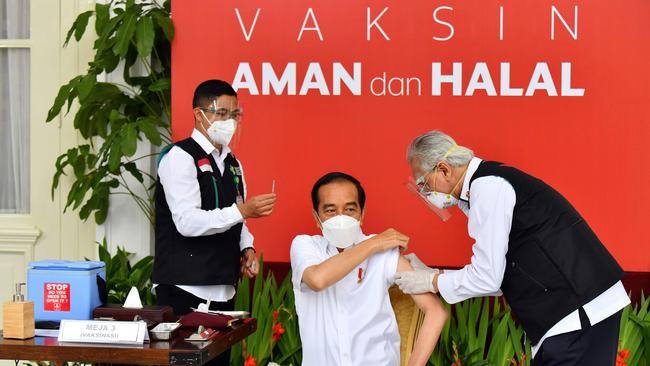Joko Widodo launches bid to turn tide on Covid with vaccination
Indonesian President Joko Widodo kicked off the national COVID-19 vaccination program on Wednesday.

As navy divers this week scoured the Java Sea for body parts from the latest aviation accident, and officials began enforcing feeble new COVID-19 restrictions to address a record surge in transmissions, Indonesia’s airlines were given the green light to run domestic flights at 100 per cent capacity.
The new transport ministry guidelines — which include mandatory mask-wearing and COVID-19 tests for passengers, and no food or drink on short flights — were ushered in without fanfare. That is not surprising given the decision could scarcely be more tone-deaf in the face of a pandemic that has spiralled out of control, and yet another moment of national grief caused by one of the world’s deadliest airline markets.
Twice in the past week, Indonesia’s daily COVID-19 transmissions have spiked at more than 10,000 from such low testing numbers the positivity rate now hovers around 25 per cent. The national caseload is above 850,000, with close to 25,000 official deaths.
New restrictions, imposed for the next fortnight, include a mandatory 7pm closing time for malls and businesses, a 75 per cent work-from-home rule for offices and 25 per cent capacity for restaurants (down from 50 per cent). Kids can go to cinemas, shop in crowded malls and sit on packed planes but schools remain closed, as they have for 11 months.
Transport ministry spokeswoman Adita Irawati told The Australian the airline relaxation did not mean all domestic flights would be full.
For instance: “It is still mandatory for (airlines) to provide an empty seat if anyone displays symptoms such as coughing or sneezing,” she said.
“This regulation is issued with the precondition of tightened air travel, which now needs recent PCR or antigen test results.”
Griffith University public health expert Dicky Budiman said the “dangerous decision reflected the poor co-ordination among sectors in dealing with the pandemic”.
Indonesian epidemiologist Pandu Riono, too, slammed the relaxation as emblematic of “illogical” policy making by a government that had all but given up trying to restrict transmission in favour of boosting the economy.
“The pandemic is like a wildfire in Indonesia. They can’t control it anymore. They are relying on the vaccine to solve everything for them,” when they should be improving “very weak” testing and tracing, he said.
President Joko Widodo kicked off the national COVID-19 vaccination program on Wednesday when he became the first person in the country to receive Chinese firm Sinovac’s CoronaVac drug since Indonesia’s Food and Drug Monitoring Agency gave it emergency use approval on Monday.
Vaccinations will begin on Friday for some 1.5 million Indonesian health workers, followed by 17.4 million public servants at high risk of infection.
The program, which prioritises working people aged 18 to 59, is a gargantuan task in a country of 17,000 islands and among a Muslim-majority population in which suspicion of vaccines is widespread.
The government has worked hard to dispel those fears. Last week, the influential Ulema Council of Indonesia declared the CoronaVac drug halal — or permitted under Islamic law.
Health Minister Budi Gunadi Sadikin, a banker appointed last month after the President finally removed his disastrous predecessor in a reshuffle, has said Indonesia must inoculate about 181 million people — 67 per cent of its population — to reach herd immunity. The government aims to do that within 15 months, a target many epidemiologists say is impossible.
Even if it wasn’t, Indonesia’s heavy reliance on CoronaVac means herd immunity may not be possible, says Professor Pandu.
While Jokowi was rolling up his shirtsleeves on national television, health experts on Wednesday were debating new figures from Brazil’s ongoing CoronaVac trial that puts its efficacy at just 50.4 per cent — barely above the World Health Organisation’s minimum 50 per cent standard.
Herd immunity occurs when 60 to 70 per cent of the population becomes immune through vaccinations or the mass spread of a disease.
Preliminary results from Indonesia’s own CoronaVac trial showed a more encouraging 65.3 per cent efficacy.
But if the vaccine is only just over 50 per cent effective, even a 100 per cent vaccination rate may not achieve herd immunity, said Professor Pandu.
Brazil’s Butantan Institute, which is conducting the trials, says its revised efficacy figure — far lower than a previously reported 78 per cent — included a group of “very mild infections” among trial subjects who received the vaccine. CoronaVac remained 78 per cent effective in preventing mild cases that needed treatment and 100 per cent effective in staving off moderate to serious cases, researchers stressed.
Additional reporting: Chandni Vasandani




To join the conversation, please log in. Don't have an account? Register
Join the conversation, you are commenting as Logout